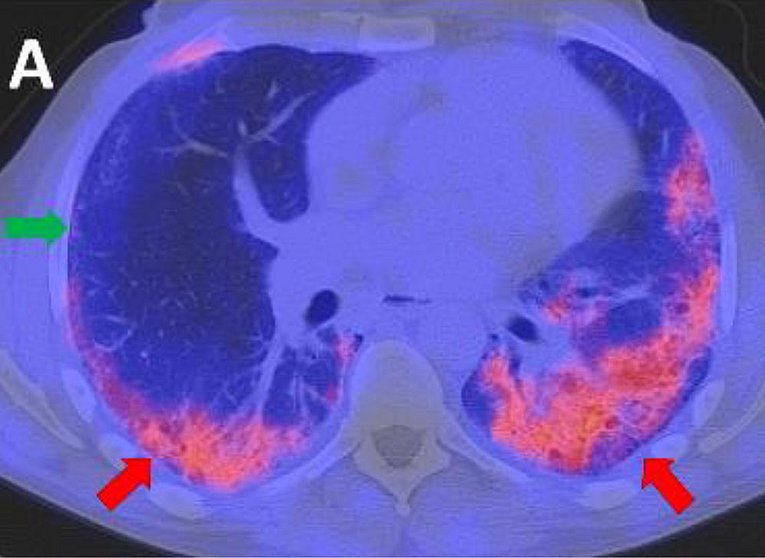The red arrows show fibrotic areas of the left and right lower lobes of the lung in a person with systemic sclerosis.
The green arrow shows non-fibrotic areas in the middle lobe.
Source: Uni-Klinikum Erlangen
What is scleroderma?
Systemic sclerosis (scleroderma) is an autoimmune disease in which damage to small blood vessels leads to inflammation in the connective tissue and later to hardening of the skin (scleroderma). Why some people develop scleroderma is still unknown. Possible triggers seem to be infections by viruses or bacteria, but hormones or tumours also promote the outbreak.
How does the disease manifest itself?
When it is cold, the fingers first hurt and turn white, then blue and finally red (Raynaud's syndrome). These circulatory disorders are coupled with swelling of the fingers. In addition, the skin on the fingers becomes hard and thick, later also on the arms, legs, face and sometimes also on the upper body. There are also deposits of connective tissue in the internal organs (fibrosis). The affected joints scar, so that mobility is restricted, as well as the mobility of the lungs, the heart or the gastrointestinal tract.
How is it recognised?
Basically, it is important to recognise the disease at an early stage in order to reduce the speed at which it spreads. Detailed medical history, capillary microscopy, special blood tests and imaging techniques help to detect the disease and assess its stage.
What can be done about it?
So far, there is no cure, although organ-specific therapies, patient care and survival have improved significantly over the last 30 years. The decisive factor is an individualised, symptom-oriented treatment depending on the organ involvement. A combination of anti-inflammatory and fibrosis-inhibiting therapy has proven effective in alleviating the signs of the disease.
Tips for everyday life
- Important for diagnosis and treatment: a specialised centre should definitely be visited in order to assess the severity of the disease and to take the right therapeutic measures.
- Important for initial diagnosis: the spectrum of disease is very wide, ranging from patients with very mild symptoms to severely ill patients. Some patients are therefore hardly limited in their life expectancy and quality of life.
Consultation hour for Rheumatology and Immunology
Special consultation hour
Mehul Lapsiwala
Panagiotis Garantziotis
Zeiten
Monday - Thursday
07.30--10.00 h and 14.00--15.30 h
Friday
07.30--11.00 h
Internistisches Zentrum
Erdgeschoss, Bauteil C
Ulmenweg 18
91054 Erlangen
Appointments only upon consultation
Use the patient app of UKER to schedule your appointment.
Alternative contact options:
Phone: +49 9131 85-34742
Fax: +49 9131 85-36448
or by e-mail to m3hsa(at)uk-erlangen.de
Hinweis
Due to the high volume of patients, initial appointments can only take place after telephone consultation between the referring colleagues and the clinic's duty physician.
Downloads
Required documents
- Certificate of Insurance (health insurance card)
- Allocation
- Copies of the preliminary findings
- X-ray images
- Reports from previous hospitalizations
- in case of initial appointment, completed questionnaire (see documents)




